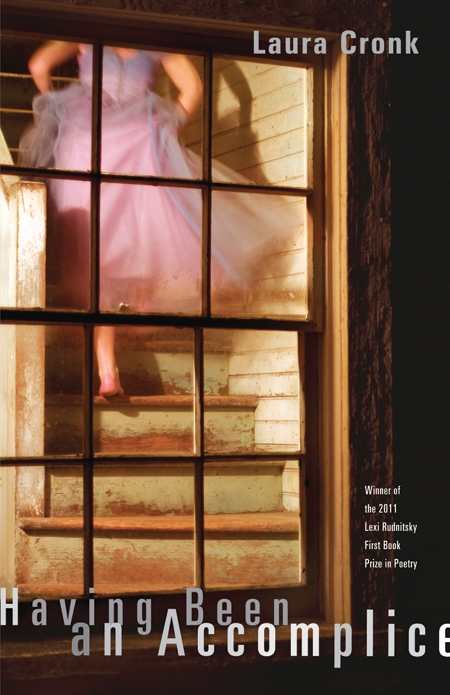Having Been an Accomplice
In “Would I Be Able to Stand,” the first poem of Laura Cronk’s collection, a woman tests the boundaries, real and imagined, of herself. “Would I be able to stand / a horse charging past?” she asks, and suddenly horse hooves boom the ground as the beast draws nearer. She answers boldly, “I think I wouldn’t flinch.” In the space between the first and second stanzas, the poem shifts focus, the horse long gone. “I wouldn’t know you,” the second stanza reads. “You, coming close / enough to graze me.”
Throughout Having Been an Accomplice, readers are taken on a woman’s exploration of a self that is limitless and all-encompassing. Sometimes muse, sometimes lover, and most often the creator, the woman who speaks through these poems opens up her brain as easily as cracking a nut, and everything that emerges is a surprise. The domestic is shaken up with the militaristic: a woman “dressed to kill” wears a brooch that makes her a general in the title poem. The conscience is never afraid of speaking up, intruding with the single word “lie” repeatedly in “I Have Humbled Myself beneath the Night Sky.” And nothing is quite as it seems: horses become men, become dreams, become God, become self. The sliding boundaries keep readers rapt in the moment, wondering exactly what and who is coming next.
The first section of the book, “Selected from the Wheel of Night,” takes readers inside intimate relationships with lovers and the material world that ultimately reflect the joys of artistic creation. In the poem “Entering,” the speaker contemplates the crushing softness of snow, equating it to mice “talking quietly when they can’t sleep / about tunneling in endless grain until / full of it, it takes them.” There is great variety in the poems of this section, from prose poems to the use of end rhymes and responding voices.
“Having Been an Accomplice,” the second section of the book, plunges readers into a sometimes surreal, utterly stunning world of war and power. The woman who speaks in this section steadily gains power, or at least the illusions of power, through her involvement as the president’s companion. After realizing that her role as lover doesn’t grant her any privileges or respect, since the orders she gives in the title poem never amount to anything, she decides that it’s “better to stop the war by doing my hair” and moves readers into domestic battlefields where enemies infiltrate dinner parties and cruelty is natural, saying, “I eat delicacies that are deaths / of poor, soft things.” The speaker admits, “I eat them up.”
Winner of the Lexi Rudinsky First Book Prize in Poetry, Having Been an Accomplice slices and dices the world in ways that leave readers feeling off-kilter and most definitely changed. Laura Cronk adds a stunning voice to the world’s poetry stage.
Reviewed by
Jennifer Fandel
Disclosure: This article is not an endorsement, but a review. The publisher of this book provided free copies of the book to have their book reviewed by a professional reviewer. No fee was paid by the publisher for this review. Foreword Reviews only recommends books that we love. Foreword Magazine, Inc. is disclosing this in accordance with the Federal Trade Commission’s 16 CFR, Part 255.

